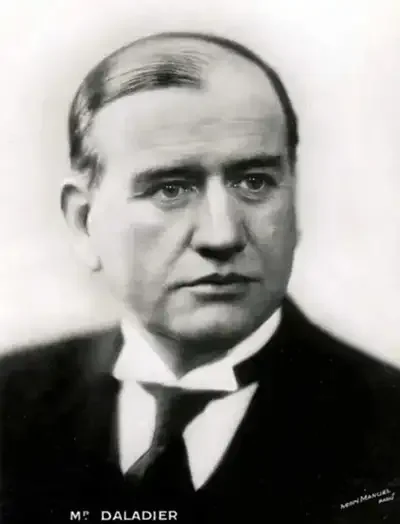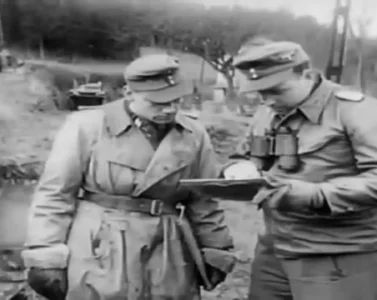- Military History
- Biographies
- Politicians Biographies
- Édouard Daladier
Édouard Daladier
French Radical-Socialist politician and the Prime Minister of France at the start of the Second World War
Born in Carpentras and educated at the Ecole Normale Superieure in Paris and the Collège-lycée Ampère, Édouard Daladier became known as a French Radical Socialist politician and protégé of radical leader Edouard Herriot. Daladier entered politics in 1919. Three times Premier, in 1933, 1934 and, his longest tenure, 1938-40, the misnamed "Bull of Vaucluse" was also Minister of War between 1936 and 1940 and thus bore the greatest political responsibility for France's defense preparations.
In 1936, Daladier sponsored a large rearmament program and a limited program to nationalize selected war industries.
He also became closely associated with the Army Commander-in-Chief, Maurice Gamelin, to whom he deferred on most military matters, devoting his own efforts to attempts to create coalition governments capable of handling France's complex economic, social and diplomatic problems.
Although a staunch republican, Daladier (who had survived Verdun) keenly appreciated the effects of the nation's World War I experience, and his restrained policies doubtless reflected the feelings of many Frenchmen. Suspicious of conservative Army leaders, he felt comfortable with the moderate Gamelin and his cautious strategy based on economic mobilization and a draftee army. For France, the next war would have to be one of economic rather than manpower attrition. Daladier thus led his party in opposing a more offensive military policy of the type advocated by Paul Reynaud and Charles de Gaulle and believed that the Army's principal task would be to guard the country's frontiers rather than actively assist her East European allies.
Once Germany's attack on Poland forced a French declaration of war, Daladier was content to let Gamelin's lengthy mobilization process slowly proceed.
The defection of the French Communist Party and the hope of the Right that France's war effort could somehow be directed against Bolshevik Russia, narrowed the Premier's base of support and limited his scope of action. Characterized as sluggish, plodding but tireless, he could never unite either Parliament or the people behind the war effort. After an autumn and winter of what was called the Phony War, his government came under increasing criticism for the Army's inactivity. However, it was the Soviet-Finnish War (Winter War) which began in December 1939 that led to Daladier's downfall.
In January 1940, France and Britain began making plans to assist Finland with troops and supplies to be sent through neutral Norway and Sweden. Their real purpose appears to have been to gain a foothold in Scandinavia and cut Germany off from her principal source of iron ore. But the end of Finnish resistance on March 12 brought the project to a halt and Daladier was blamed for both the Russian victory and the Allied failure to interdict German trade. Advocates of war with Germany wanted a stronger leader at the helm, and opponents hoped for a weaker successor. As a result, on the 20th of March 1940, Daladier resigned the premiership. He was succeeded the next day by his Finance Minister and political rival, Paul Reynaud.
Still a powerful leader in the key Radical Party, Daladier could keep his portfolio as Minister of War and he continued to defend Gamelin and his conduct of the war. Although militarily strong, France was still politically weak on the eve of the German attack in May. The French debacle at Sedan finally led to the ouster of both Daladier and Gamelin, although the former stayed in the government as Minister of Foreign Affairs until June 5.
Arrested by the Vichy Government (Vichy France) in September 1940, Daladier was tried at Riom (Riom Trial) early in 1942 for his part in the French defeat but defended himself vigorously and with honor. Handed over to the Germans the following year, he was liberated in 1945 and successfully reentered politics after the war.
Daladier secured his election to the new Constituent Assembly in 1946 and later that year he was voted into the National Assembly, where he served until 1958. He died in 1970.
Édouard Daladier - Quick Facts
- WWI (1914-1918)
- WWII (1939-1945)
- Winter War (1939-1940)
- {{#owner}}
- {{#url}} {{#avatarSrc}}
{{name}} {{/url}} {{^url}} {{#avatar}} {{& avatar}} {{/avatar}} {{name}} {{/url}} - {{/owner}} {{#created}}
- {{created}} {{/created}}
























